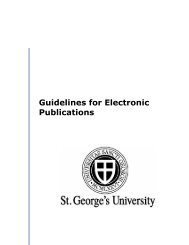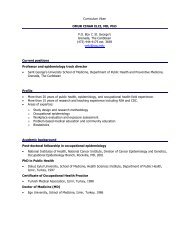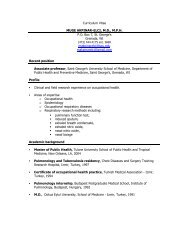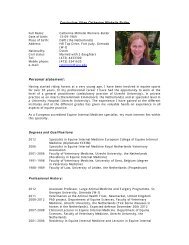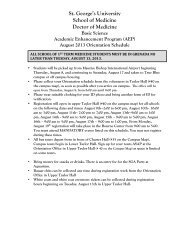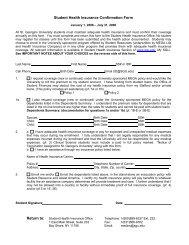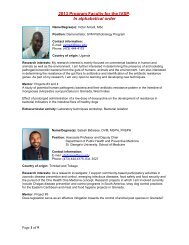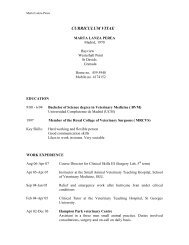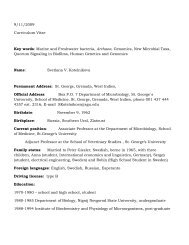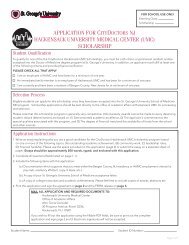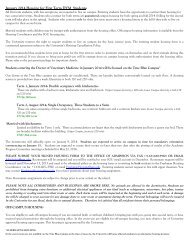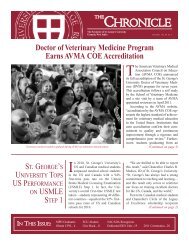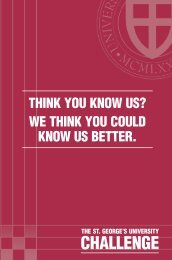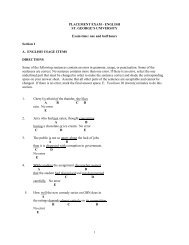SCHOOL OF 2012-2013 - St. George's University
SCHOOL OF 2012-2013 - St. George's University
SCHOOL OF 2012-2013 - St. George's University
You also want an ePaper? Increase the reach of your titles
YUMPU automatically turns print PDFs into web optimized ePapers that Google loves.
CHEM 224/CHEM 225<br />
Organic Chemistry II/Organic Chemistry II Lab<br />
An advanced course in the structure and reactivity<br />
of functional groups (aromatic compounds, carbonyl<br />
compounds, carbohydrates, organometallic compounds,<br />
carboxylic acids and their derivatives, amines, and amino<br />
acids). This course covers all the essential material needed<br />
for biochemistry.<br />
CHEM 450<br />
Biochemistry<br />
This is a 4-credit biochemistry course in the premedical/<br />
foundation program. The course covers the structure and<br />
function of biological molecules, the biochemical pathways<br />
of intermediary metabolism and their regulation in normal<br />
and aberrant states. The course is designed to help<br />
students integrate the biochemical information covered by<br />
this course into meaningful knowledge with an emphasis<br />
on the functional significance and regulatory mechanisms<br />
governing metabolic pathways.<br />
COMH 201<br />
Community Health<br />
Health is more than a personal matter. People do not live<br />
in isolation, unaffected by others; their health is very much<br />
determined by the world they live in and the dynamic<br />
relationship that they experience with their community.<br />
The goal of the Community Health course is to provide an<br />
understanding of population-based health as opposed to<br />
individual health.<br />
ENGL 104/ENGL 106<br />
Introduction to College Reading/Writing<br />
This course involves the study and practice of reading<br />
comprehension through structure, meaning, and evaluation.<br />
ENGL 204<br />
Public Speaking<br />
There are many occasions in professional and private life<br />
that call for individuals to speak in public. This course<br />
is designed to introduce students to the fundamentals<br />
of public speaking. It will consider the importance of<br />
communication and cover speech building (including the<br />
collection and collation of material, structure, and content),<br />
speech writing, and event management.<br />
ENGL 305<br />
Advanced College Writing<br />
Advanced College Writing covers the instruction and<br />
practice in expository writing and vocabulary expansion.<br />
This course is useful for teachers, professionals, and anyone<br />
who wishes to improve their general communication skills.<br />
ENGL 306<br />
Critical Reading Review<br />
This course places an emphasis on the critical reading of<br />
expository prose and vocabulary expansion; improvement<br />
in reading rate and comprehension is the ultimate goal.<br />
MATH 130<br />
Mathematics for Critical Thinking<br />
An introduction to mathematical modeling, overcoming<br />
quantitative illiteracy, and the development of<br />
mathematical competency are the main features of this<br />
course. Mathematics for Critical Thinking is neatly tailored<br />
to fit the needs of students who are not mathematics<br />
majors, but are taking mathematics for liberal arts<br />
purposes. The course seeks to develop and enhance<br />
problem-solving capabilities and enable students to apply<br />
simple mathematical models as a means of solving real<br />
world problems, as well as to become more competent<br />
mathematically through the exercise of logic.<br />
MATH 220<br />
<strong>St</strong>atistics<br />
<strong>St</strong>atistics is designed to assist students in acquiring a good<br />
intuitive grasp of statistics, specifically in terms of what it<br />
is, how and when to apply various statistical techniques,<br />
how to interpret results, and how to draw meaningful<br />
conclusions from the data.<br />
NUTR 201<br />
Nutrition<br />
This course introduces students to basic nutrition<br />
information, which will help them to understand the<br />
relationship between diet and the prevention and/or<br />
control of diseases.<br />
PHYS 201<br />
General Physics I<br />
This course consists of linear kinematics, works,<br />
power, energy, momentum, a brief introduction to<br />
heat, thermodynamics, and sound. This course does<br />
not require mastery of calculus and is designed to help<br />
School of Medicine<br />
Course Descriptions<br />
School of Medicine Catalog <strong>2013</strong>–2014 | 55



